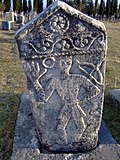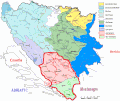Stara Ćuprija | |
|---|---|
 | |
| Coordinates | 43°39′03.9″N 17°57′45.8″E / 43.651083°N 17.962722°E |
| Carried | Pedestrians |
| Crossed | Neretva |
| Locale | Konjic, Bosnia and Herzegovina |
| Other name(s) | Old stone bridge in Konjic |
| Heritage status | National Monument of BiH |
| Characteristics | |
| Design | Multiple-Arch |
| Material | Tufa |
| Trough construction | Mortar |
| Pier construction | Stone |
| Total length | - metres |
| Width | 4 metres |
| No. of spans | 6 |
| Piers in water | 5 |
| Clearance below | - metres at mid-span |
| History | |
| Constructed by | Ali-aga Hasečić |
| Construction start | 1682 |
| Construction end | 1683 |
| Opened | 1683 |
| Rebuilt | 2009 |
| Collapsed | March 1945 |
| Location | |
|
| |
Stara Ćuprija ( Bosnian: The Old Bridge) is a bridge spanning the Neretva River in the town of Konjic, Bosnia and Herzegovina. It is a significant example of Ottoman bridge architecture in the Balkans, and is a listed National Monument of Bosnia and Herzegovina. [1]
History

The bridge was built between 1682 and 1683 by Ali-aga Hasečić (as commemorated by a stone plaque at the center span) atop six slightly-pointed stone arches. In March 1945, the bridge's deck was destroyed by explosive charges laid by the retreating German army. While the arches suffered heavy damage, all five piers survived, preserving the bridge's basic structural integrity and permitting eventual reconstruction. [1]
After World War II, the Yugoslav government decided to temporarily repair the bridge for basic use, with a makeshift deck made of iron beams laid across the still-intact masonry piers supporting a one-lane tarmac for motorized vehicle traffic. This temporarily solution lasted for more than five decades, until after the Yugoslav Wars. The bridge was restored to its original appearance with European financial assistance between 2003 and 2009, and is once again a landmark of Ottoman architecture in Bosnia and Herzegovina.
The bridge was reopened on 16 June 2009. [2]
See also
References
- ^ a b "Komisija za očuvanje nacionalnih spomenika". old.kons.gov.ba.
- ^ "Otvoren Stari kameni most u Konjicu". Historija.ba (in Bosnian).
External links
-
 Media related to
Konjic Bridge at Wikimedia Commons
Media related to
Konjic Bridge at Wikimedia Commons
- Ottoman bridges in Bosnia and Herzegovina
- National Monuments of Bosnia and Herzegovina
- Demolished bridges
- Bridges completed in 1683
- Rebuilt buildings and structures in Bosnia and Herzegovina
- Bridges completed in 2009
- Stone arch bridges in Bosnia and Herzegovina
- Stone arch bridges
- Buildings and structures in Konjic
- Bridges over the Neretva in Bosnia and Herzegovina
Stara Ćuprija | |
|---|---|
 | |
| Coordinates | 43°39′03.9″N 17°57′45.8″E / 43.651083°N 17.962722°E |
| Carried | Pedestrians |
| Crossed | Neretva |
| Locale | Konjic, Bosnia and Herzegovina |
| Other name(s) | Old stone bridge in Konjic |
| Heritage status | National Monument of BiH |
| Characteristics | |
| Design | Multiple-Arch |
| Material | Tufa |
| Trough construction | Mortar |
| Pier construction | Stone |
| Total length | - metres |
| Width | 4 metres |
| No. of spans | 6 |
| Piers in water | 5 |
| Clearance below | - metres at mid-span |
| History | |
| Constructed by | Ali-aga Hasečić |
| Construction start | 1682 |
| Construction end | 1683 |
| Opened | 1683 |
| Rebuilt | 2009 |
| Collapsed | March 1945 |
| Location | |
|
| |
Stara Ćuprija ( Bosnian: The Old Bridge) is a bridge spanning the Neretva River in the town of Konjic, Bosnia and Herzegovina. It is a significant example of Ottoman bridge architecture in the Balkans, and is a listed National Monument of Bosnia and Herzegovina. [1]
History

The bridge was built between 1682 and 1683 by Ali-aga Hasečić (as commemorated by a stone plaque at the center span) atop six slightly-pointed stone arches. In March 1945, the bridge's deck was destroyed by explosive charges laid by the retreating German army. While the arches suffered heavy damage, all five piers survived, preserving the bridge's basic structural integrity and permitting eventual reconstruction. [1]
After World War II, the Yugoslav government decided to temporarily repair the bridge for basic use, with a makeshift deck made of iron beams laid across the still-intact masonry piers supporting a one-lane tarmac for motorized vehicle traffic. This temporarily solution lasted for more than five decades, until after the Yugoslav Wars. The bridge was restored to its original appearance with European financial assistance between 2003 and 2009, and is once again a landmark of Ottoman architecture in Bosnia and Herzegovina.
The bridge was reopened on 16 June 2009. [2]
See also
References
- ^ a b "Komisija za očuvanje nacionalnih spomenika". old.kons.gov.ba.
- ^ "Otvoren Stari kameni most u Konjicu". Historija.ba (in Bosnian).
External links
-
 Media related to
Konjic Bridge at Wikimedia Commons
Media related to
Konjic Bridge at Wikimedia Commons
- Ottoman bridges in Bosnia and Herzegovina
- National Monuments of Bosnia and Herzegovina
- Demolished bridges
- Bridges completed in 1683
- Rebuilt buildings and structures in Bosnia and Herzegovina
- Bridges completed in 2009
- Stone arch bridges in Bosnia and Herzegovina
- Stone arch bridges
- Buildings and structures in Konjic
- Bridges over the Neretva in Bosnia and Herzegovina



